October 12, 2022 - No. 27
New Premier of Alberta
The Swearing In of Danielle Smith
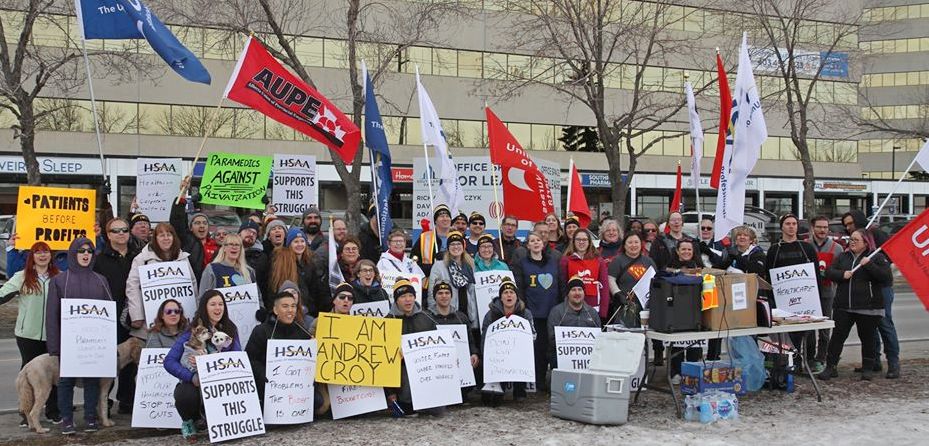
Calgary
demonstration for public health care, January 30, 2020, one of
many
actions by Albertans against anti-social offensive of the UCP
government.
• Who Is Danielle Smith and What Does
She
Want?
New Premier of Alberta
The Swearing In of Danielle Smith
On October 6, Alberta's United Conservative Party (UCP) elected Danielle Smith as its new leader. She was sworn in as Alberta's 19th Premier on October 11. She does not have a seat in the legislature; the MLA for Brooks-Medicine Hat, Michaela Frey, has resigned, and Smith has announced that she will run for the seat in a by-election. Smith declined to run in the vacant seat in Calgary-Elbow, and announced there will not be a by-election in that riding which will remain without an MLA until the spring election, an indication that the UCP does not consider the riding a safe seat.
Smith replaces Jason Kenney who announced that he would resign last May after receiving only 51.4 per cent support in a leadership review. In making the announcement, Kenney stated, "While 51 per cent of the vote passes the constitutional threshold of a majority, it clearly is not adequate support to continue on as leader."
Danielle Smith was elected on the sixth ballot with 53.77 per cent of the vote, beating Kenney's preferred successor, former finance minister Travis Toews, who got 46.23 per cent. It is clear that Kenney's resignation and Smith's election have done nothing to create a "United Conservative Party."
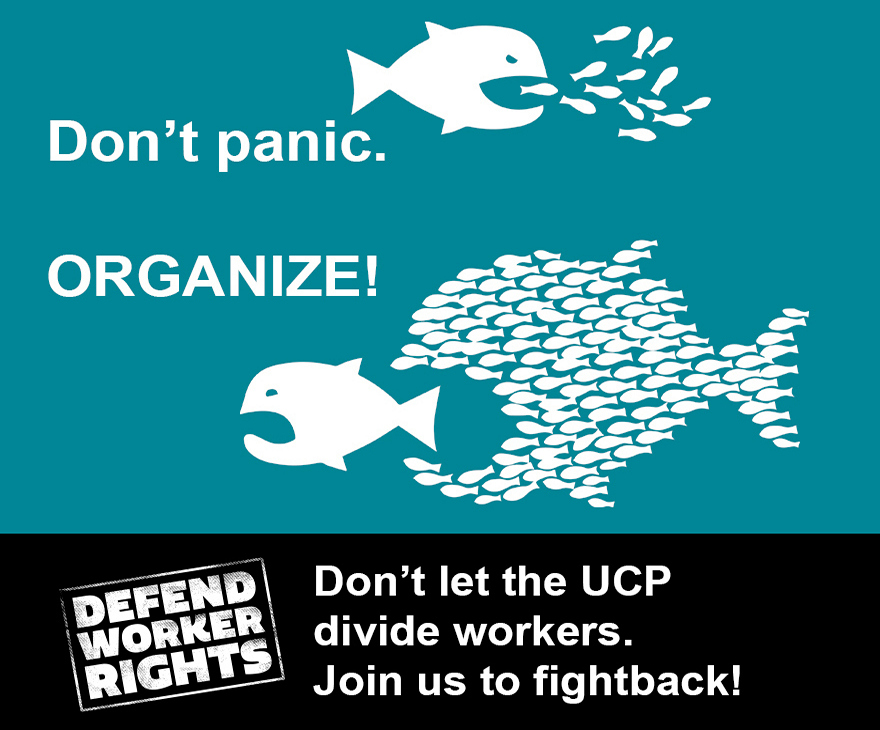 There
were seven candidates in the race, including four former members of
Jason Kenney's cabinet, with Smith declared front-runner soon after she
announced her candidacy. The UCP reported that 84,593 votes were cast,
with 123,915 eligible to vote, for a turnout of 68 per cent. This
means that Smith was selected as Premier by about 1.6 per cent of
registered voters in Alberta, and was the first choice of less than
that. The crisis of legitimacy of not only the rule of the UCP in
Alberta but of the democratic institutions themselves that can bring a
premier to power on such a basis therefore deepens and, with the
inability of the democratic institutions to appear to be
representative, the constitutional crisis also deepens.
There
were seven candidates in the race, including four former members of
Jason Kenney's cabinet, with Smith declared front-runner soon after she
announced her candidacy. The UCP reported that 84,593 votes were cast,
with 123,915 eligible to vote, for a turnout of 68 per cent. This
means that Smith was selected as Premier by about 1.6 per cent of
registered voters in Alberta, and was the first choice of less than
that. The crisis of legitimacy of not only the rule of the UCP in
Alberta but of the democratic institutions themselves that can bring a
premier to power on such a basis therefore deepens and, with the
inability of the democratic institutions to appear to be
representative, the constitutional crisis also deepens.
The Angus Reid Institute released a poll on September 30 in which Smith received the most negative assessment of the three front-runners, with 55 per cent of Albertans viewing Smith as "bad" or "terrible" for the province. Despite this, when elected Smith declared "the big Conservative family is all together in one room, united and strong." In fact, the dysfunction of the UCP, like the PCs before it, shows the crisis of the cartel party system and inability to sort out its contradictions.
No leader of the Progressive Conservatives, which governed Alberta for 44 years, or of the United Conservative Party, has left office willingly since Ralph Klein whose government acted as a proving ground for the anti-social offensive. With the exception of Jim Prentice, who was defeated by the NDP, all of the PC/UCP leaders since that time have been forced to resign by their own caucus or Party without completing one term in office after winning the provincial election.[1]
The ugly dog-fight for the leadership of the UCP has only deepened the crisis of legitimacy of the "democratic institutions" and Westminster system. The cartel party system exists to keep the people from exercising their right to govern themselves, and in no way does the polity accept that Smith has a mandate to rule over them.
Note
1. Progressive Conservative Premier Ralph Klein made it to his third term before he was forced to resign in 2006. Ed Stelmach "came up from behind" in a three-way race in which he was a distant third on the first ballot to become leader of the PCs. He was forced to resign when the oil and gas monopolies reacted with outrage to his timid changes to royalty rates. Stelmach was followed by Alison Redford, who won despite almost zero support from caucus, became premier October 7, 2011, won the 2012 election, and resigned March 23, 2014. She too was forced to resign, this time over various "scandals," chief of which was to think she could be premier without the backing of the "old boys club." She was followed by interim leader Dave Hancock, who served as Premier for six months, followed by Jim Prentice, who became Premier September 15, 2014 after resigning from the cabinet of Stephen Harper. He called an election held May 5, 2015 and was defeated by Rachel Notley's NDP, with the PCs reduced to ten seats, in third place behind Wildrose. Prentice resigned and later died in a plane crash. Then came Kenney, also forced to resign after receiving only 51 per cent support in a leadership review, insufficient for him to keep his caucus under control.
Who Is Danielle Smith and What Does She Want?
The new Premier of Alberta Danielle Smith has a less than illustrious political career. She was groomed by the Fraser Institute and has worked as a columnist and member of the editorial board of the Calgary Herald as well as in radio and TV.
In 2009 Smith became leader of the Wildrose Party. Pollsters declared she would win the 2012 provincial election, a wildly inaccurate prediction. Then in 2014 she led eight Wildrose MLAs to cross the floor and join the short-lived Progressive Conservative (PC) government of Jim Prentice. This infuriated both PC and Wildrose supporters, especially when it was revealed that although she had denounced two Wildrose MLAs who had crossed the floor several months earlier, she had been in talks with Prentice about joining the PCs at the time. Her decline was so spectacular that she failed to win the PC nomination for the 2015 provincial election, ending her political career until she emerged to run for leader of the UCP.
Earlier, during her first foray into elected office as a member of the Calgary School Board, she was credited with a major role in making the board so dysfunctional that its chair said it could no longer operate, leading to the firing of the board by the provincial government.
At a leadership debate organized by the separatist group Alberta Prosperity Project, she said she was "putting our civil service on notice, all 240,000 of them, that every single decision they make must be put through the lens of putting Alberta first." In fact, there are approximately 25,000 people directly employed by the Alberta government, of whom around 2,200 are excluded from the union because they are deemed to have some level of decision-making authority.
Smith also pledged to replace the entire board of Alberta Health Services (AHS), fire members of the College of Physicians and Surgeons, and conduct a "public investigation" of the Chief Medical Officer of Health. This is evidence that Smith will continue to concentrate power in the hands of the executive and rule by executive decree.
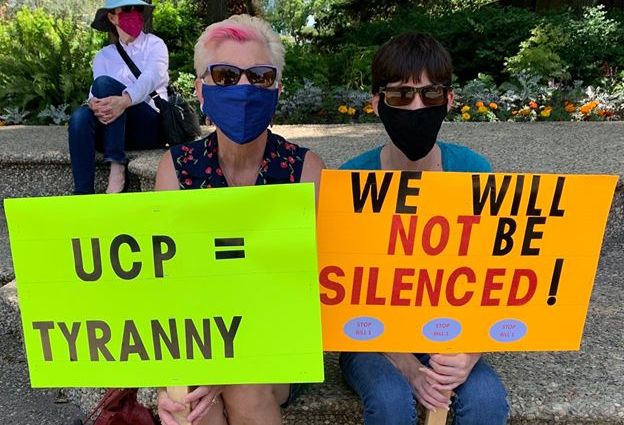 Smith
is notorious for her attacks on the right to conscience. In a
column
published in the Calgary Herald and the Edmonton Journal in
2019, she
launched a diatribe against communism, the Soviet Union, and
"public
school social studies teachers [who] seem to lean toward
Marxism" and
then called
on school boards to start firing teachers whose methods she
decried.
Smith
is notorious for her attacks on the right to conscience. In a
column
published in the Calgary Herald and the Edmonton Journal in
2019, she
launched a diatribe against communism, the Soviet Union, and
"public
school social studies teachers [who] seem to lean toward
Marxism" and
then called
on school boards to start firing teachers whose methods she
decried.
Smith proposed and campaigned on an "Alberta Sovereignty Act" which, as advertised, was aimed at empowering the province to ignore any federal law it chooses on the basis of a "free vote" of the legislature and to defy any federal court ruling that goes against it. Companion legislation would replace the RCMP in favour of a provincial police force, establish an Alberta pension plan to replace the Canada Pension Plan, and mandate direct collection of provincial taxes by the provincial government from the province's businesses and public employees that they now send to the federal revenue agency. Smith accuses the Trudeau Liberals of wanting to exercise control over every aspect of people's lives, while saying she stands for "freedom."
Following Smith’s election, her chief advisor Rob Anderson issued a statement “clarifying” that the proposed "Alberta Sovereignty Act" would respect decisions of the Supreme Court of Canada. In a news conference following her swearing-in, Smith said, "When the Supreme Court makes a decision we have to abide by that."
Five of the seven candidates in the UCP leadership race, plus the outgoing premier and leader of the UCP Jason Kenney, called the proposed act unconstitutional, a violation of the rule of law and separation of powers, and presented themselves as the defenders of the "democratic institutions." The Lieutenant-Governor even weighed in to say she might not sign such a law.
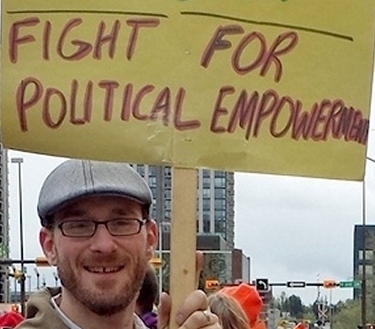 All
of it is to divide the people pro this and con that rather than working
together to modernize the electoral process and write a modern
constitution. A the constitutional crisis exists in Canada which the
people need to address to avert the disasters which lie ahead if the
people are divided or rendered passive because of their lack of a
movement which empowers them. The current constitutional order designed
to preserve the state permits the concentration of power in the
executive and the creation of governments of police powers. The
legislatures are made increasingly irrelevant, rule of law is trashed,
and Canada's human and natural assets are put in the service of the
rich and the U.S. imperialist war machine while even the most basic
needs of the people are not met.
All
of it is to divide the people pro this and con that rather than working
together to modernize the electoral process and write a modern
constitution. A the constitutional crisis exists in Canada which the
people need to address to avert the disasters which lie ahead if the
people are divided or rendered passive because of their lack of a
movement which empowers them. The current constitutional order designed
to preserve the state permits the concentration of power in the
executive and the creation of governments of police powers. The
legislatures are made increasingly irrelevant, rule of law is trashed,
and Canada's human and natural assets are put in the service of the
rich and the U.S. imperialist war machine while even the most basic
needs of the people are not met.
Smith's zeal to get Alberta out of the Constitution is used by the media and pundits to spread disinformation about how matters stand in Alberta and federally. They even reimagine Kenney as a "moderate," a pillar of stability and decency and are now floating the proposal to have the NDP show it is capable of providing "stability" and "moderation." "Stability" and "moderation" mean that all the resources of Alberta are directed at paying the rich, serving the U.S. war machine with the energy resources it requires, and keeping the working class, Indigenous peoples and Métis in check.
In her acceptance speech in Calgary on October 6, Smith revealed a lot about her vision of Alberta. She described Albertans as "pioneers and farmers, entrepreneurs and innovators, communities and families." She did not recognize the existence of the working class or even acknowledge the Indigenous peoples and Métis. Later in the speech she further defined who she identifies as the "we" in Alberta. "We are entrepreneurs and business people," she said claiming that, nonetheless, the "we" would rule in a compassionate way.
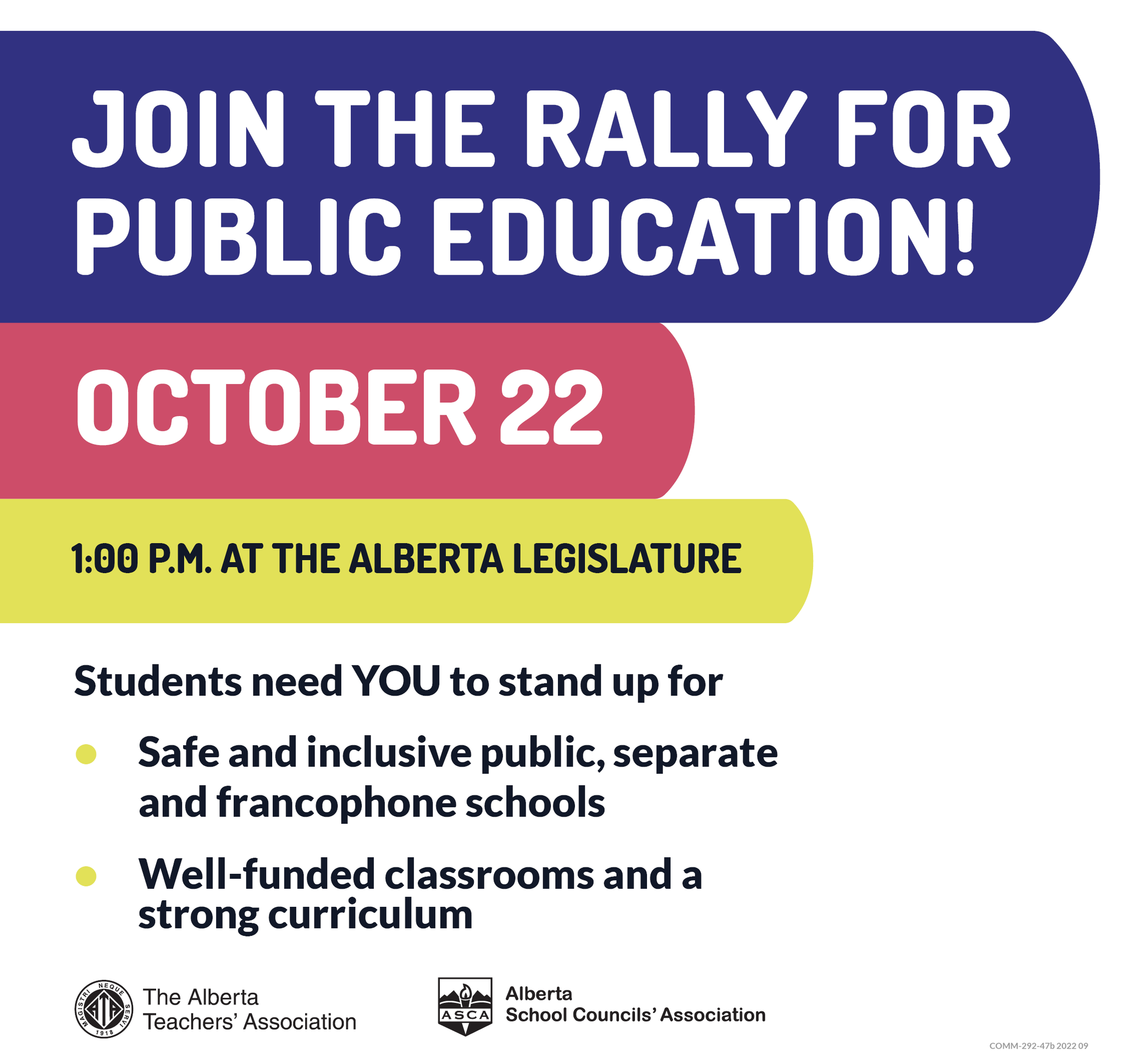 The
fact is that the future lies in the fight of the working people
of
Alberta and the youth to uphold the rights of all. Alberta
teachers are
organizing and preparing for an important rally at the
Legislature on
October 22, calling on everyone to join in. Health care workers
and
their unions
are speaking out about their concerns and demands. Conviction is
palpable about the need to strengthen the resistance of the
working
class and people to governments of police powers. Increased
poverty,
inflation, the crisis in health care, violence against women,
minorities and Indigenous peoples,
the assault on the right to education, homelessness and much
more face
everyone every day.
The
fact is that the future lies in the fight of the working people
of
Alberta and the youth to uphold the rights of all. Alberta
teachers are
organizing and preparing for an important rally at the
Legislature on
October 22, calling on everyone to join in. Health care workers
and
their unions
are speaking out about their concerns and demands. Conviction is
palpable about the need to strengthen the resistance of the
working
class and people to governments of police powers. Increased
poverty,
inflation, the crisis in health care, violence against women,
minorities and Indigenous peoples,
the assault on the right to education, homelessness and much
more face
everyone every day.
The election of Danielle Smith reveals not the need to defend the "existing constitutional order," but that the people must provide modern definitions for the mass democracy needed in the 21st century. Such a democracy is based on activating the human factor/social consciousness to provide the problems the society faces with solutions. It gives rise to a constitutional order which vests sovereignty in the people and creates institutions that make sure the claims of the people are satisfied.
Instant Run-Off Voting
In the election conducted by the United Conservative Party (UCP) to choose a new leader, it used a method called "instant run-off voting." Wikipedia explains it as follows:
"Instant-runoff voting (IRV) is a type of ranked preferential voting method. It uses a majority voting rule in single-winner elections where there are more than two candidates. [...]
"Voters in IRV elections rank the candidates in order of preference. Ballots are initially counted for each voter's top choice. If a candidate has more than half of the first-choice votes, that candidate wins. If not, then the candidate with the fewest votes is eliminated, and the voters who selected the defeated candidate as a first choice then have their votes added to the totals of their next choice. This process continues until a candidate has more than half of the votes. When the field is reduced to two, it has become an 'instant runoff' that allows a comparison of the top two candidates head-to-head. IRV is not a proportional voting system but rather a 'winner takes all' method, as it elects only one winner in an election (in one district).
"IRV is usually used where first-past-the-post voting (FPTP) was abandoned, and to be better in line with the (absolute) majority rule in single-winner elections. Where there are more than two candidates and none wins a majority, IRV prevents a candidate with the most votes but not a majority from winning by default."
We are to believe that such a method is more democratic which covers up the point that the fundamental nature of the exercise is anti-people and anti-democratic. Using such methods does nothing to address the crisis of legitimacy of the Westminster system of government and so-called democratic institutions.
But the question remains as to why the UCP membership decided on Smith as the winner? Why her and not one of the others? Certainly it does not help their cause that she lacks a seat. One analysis by Lisa Young, Professor of Political Science at the University of Calgary says:
"The party's membership is predominantly located outside Calgary and Edmonton. Unlike many other parties' rules for electing a leader, there was no weighting of votes by electoral district to ensure the new leader has support from across the province.
"Each vote was counted equally. Anti-establishment populist sentiment is strong in rural Alberta."
Is this really how things pose themselves? How do votes get weighted equally when it is not possible to know what the person who votes actually wants? The words "anti-establishment populist sentiment" do not tell us anything about what it means to be "anti-establishment" or why people in rural Alberta are "anti-establishment" or said to be "anti-establishment." If the people of rural Alberta are "anti-establishment" does that make the people of Calgary and Edmonton "pro-establishment?"
One thing seems obvious -- Canadians can now expect that the election of Danielle Smith as leader of the UCP and therefore Premier of Alberta will be used as fodder for certain forces to slander and make spurious claims about Albertans being reactionary. It seems obvious that the workers will be called on to preserve the liberal democratic institutions from the danger posed to them by anti-establishment populist Albertans who, it is claimed, are represented by Danielle Smith, all evidence to the contrary.
What the developments nonetheless reveal is the urgency with which the workers and the youth should heed the call to get together to discuss the crisis in which the democratic institutions are mired and how this affects their lives and what they can do to turn things around in their favour. They must not accept to have discussion reduced to choosing voting methods in a manner which covers up the content of the rule imposed on them. The aim must be to empower the workers and people politically so that they can participate in making the decisions which affect their lives.
Methods used to divide the people spread disinformation about their concerns, beliefs, desires, aspirations, experiences and perceptions. They are promoted by the narrow private interests which direct the cartel parties, their courtiers and retinues who are either unwilling or incapable of renewing the democracy in a manner that humanizes the natural and social environment and brings in a new coherence which is so much needed at this point in time. An important starting point is to take a firm stand that the crisis Alberta finds herself in is not caused by so-called anti-establishment rural Albertans who we are to believe are profoundly reactionary and dangerous.
(To access articles individually click on the black headline.)
Website: www.cpcml.ca Email: editor@cpcml.ca

